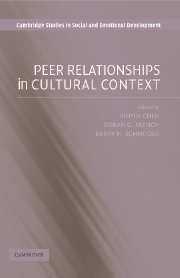Book contents
- Frontmatter
- Contents
- List of Contributors
- Introduction
- Part I Culture and Peer Relationships: Theoretical and Methodological Issues
- 2 Children's Social Behaviors and Peer Interactions in Diverse Cultures
- 3 Cultural Influences on Peer Relations: An Ecological Perspective
- 4 Analytic Considerations in Cross-Cultural Research on Peer Relations
- 5 Qualitative Research on Children's Peer Relations in Cultural Context
- Part II Temperamental and Emotional Influences on Peer Relationships
- Part III Peers and Parents
- Part IV Peer Interactions and Social Behaviors
- Part V Friendships
- Author Index
- Subject Index
- References
3 - Cultural Influences on Peer Relations: An Ecological Perspective
from Part I - Culture and Peer Relationships: Theoretical and Methodological Issues
Published online by Cambridge University Press: 08 August 2009
- Frontmatter
- Contents
- List of Contributors
- Introduction
- Part I Culture and Peer Relationships: Theoretical and Methodological Issues
- 2 Children's Social Behaviors and Peer Interactions in Diverse Cultures
- 3 Cultural Influences on Peer Relations: An Ecological Perspective
- 4 Analytic Considerations in Cross-Cultural Research on Peer Relations
- 5 Qualitative Research on Children's Peer Relations in Cultural Context
- Part II Temperamental and Emotional Influences on Peer Relationships
- Part III Peers and Parents
- Part IV Peer Interactions and Social Behaviors
- Part V Friendships
- Author Index
- Subject Index
- References
Summary
Bronfenbrenner's ecological perspective (e.g., Bronfenbrenner, 1979; Bronfenbrenner & Morris, 1998) has had a deep and far-reaching effect on the study of human development during the past three decades. It has led researchers to investigate many influences on development beyond those that are immediate to the individual in space and time. The results of these investigations have greatly expanded and enriched our knowledge of the ways in which developing individuals are influenced by cultural beliefs, social policies and institutions, and experiences in interpersonal processes.
In the study of children's peer relations in cultural context, one of the enduring challenges has been to find ways to demonstrate the processes by which particular characteristics of cultures are linked to particular dimensions or patterns of peer relationships (Schneider, 2000). The ecological perspective offers a response to this challenge. The goal of this chapter is to show that cultural beliefs and values are manifest in children's peer relations through events and circumstances at intermediate levels of the environment. This ecological conceptualization allows researchers to identify and investigate mediating factors in the links between culture and peer relations.
Following a brief summary of Bronfenbrenner's ecological perspective, three cultures with contrasting positions on the continuum of collectivism–individualism will be introduced. These contrasting positions and their manifestations in the United States, Sweden, and the Maisin of Papua New Guinea will be traced through the layers of the ecological environment to the peer relations of children by means of a review of research findings.
- Type
- Chapter
- Information
- Peer Relationships in Cultural Context , pp. 52 - 74Publisher: Cambridge University PressPrint publication year: 2006
References
- 10
- Cited by

